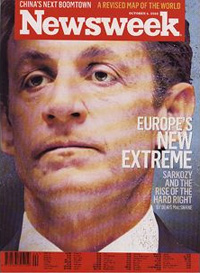 Sweden has revealed the future direction of Europe, and not for the first time. For decades, Sweden led the way in defining the mixed model of free trade and social solidarity that became the European ideal. Not anymore. In the election this month Swedish voters joined their less successful EU neighbors in turning their backs on traditional politics, in which the pendulum swung between parties advocating more free trade and parties on the center left advocating more solidarity—but no further. Now even the solid Swedes have ushered in to Parliament a block of single-issue politicians obsessed with the perceived loss of national identity and angry about immigrants and other outsiders who supposedly threaten their Swedishness.
Sweden has revealed the future direction of Europe, and not for the first time. For decades, Sweden led the way in defining the mixed model of free trade and social solidarity that became the European ideal. Not anymore. In the election this month Swedish voters joined their less successful EU neighbors in turning their backs on traditional politics, in which the pendulum swung between parties advocating more free trade and parties on the center left advocating more solidarity—but no further. Now even the solid Swedes have ushered in to Parliament a block of single-issue politicians obsessed with the perceived loss of national identity and angry about immigrants and other outsiders who supposedly threaten their Swedishness.
Thus the arrival of a new politics in Europe. A decade ago extremist politics was confined to fringes and street protests. It has now arrived as a parliamentary force and is beginning to change how other parties behave and speak. The binary politics between a Christian democratic right and social democratic left, with a small space for classic liberal parties, is now over. The world’s biggest democratic region, the 46 nation-states grouped in the Council of Europe, is now giving birth to a centrifugal politics with identity replacing class alignment. No single party or political formation can win control of the state and govern on the basis of a manifesto with majority support from voters. Even Britain requires a coalition to have a majority in the House of Commons. Belgium and the Netherlands still have not formed governments months after elections produced inconclusive results.
Postwar Europe had one great foe and one great friend to produce unity of political purpose, even if big parties battled over priorities. Social and Christian democrats were united against sovietism and Moscow’s proxy parties on the communist left. The United States allied itself to the moderate right and left to create NATO, support the suppression of nationalisms with the creation of the European Union, and wean Europeans away from protectionist economics in favor of open trade and competitive markets.
Now Europe no longer faces an agreed common threat, despite the best efforts of an Islamaphobe right to present Muslims as an alien invading force that must be confronted and contained. Nor is the United States an inspiration any longer. Presidents George W. Bush and Barack Obama have been quagmired in their respective wars in Iraq and Afghanistan, from which most Europeans recoil with dismay. The recession and banking crisis are blamed on unregulated American free markets. Even the business minister for David Cameron’s new Conservative government, Vince Cable, was heard lashing out at the evils of capitalism and the “murky world” of corporate behavior at his party conference this month in Liverpool. Read full article in Newsweek...
Netherlands
Wilders trial opens
Accused of incitement to racial hatred against Muslims, Dutch populist Geert Wilders went on trial in Amsterdam on October 4. NRC Handelsblad explains that the leader of the immigrant-baiting PVV (Freedom Party), the country's second largest parliamentary group, called for his trial judge to be substituted on the grounds of bias. He also intends to exercise his right to silence and not answer questions during the trial. In a declaration he argued that “it’s the free speech of many Dutch people that is being prosecuted” and that “democracy needs a free and open debate, above all on sensitive issues.” Having labelled Islam as “fascist”, as well as for calling for an outright ban on the Koran, which he compares to Hitler’s Mein Kampf, Wilders faces a one year prison sentence or a €7,600 fine.
Was this article useful? If so we are delighted!
It is freely available because we believe that the right to free and independent information is essential for democracy. But this right is not guaranteed forever, and independence comes at a cost. We need your support in order to continue publishing independent, multilingual news for all Europeans.
Discover our subscription offers and their exclusive benefits and become a member of our community now!












